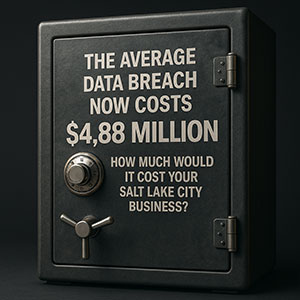 Cybercriminals Are Targeting Salt Lake Construction Firms—and Most Aren’t Ready
Cybercriminals Are Targeting Salt Lake Construction Firms—and Most Aren’t Ready
Here’s something Salt Lake’s construction leaders need to hear loud and clear: Hackers don’t care how many buildings you’ve put up or what your bid calendar looks like. If your IT infrastructure is weak, your company’s a target.
More and more cybercriminals are focusing their attacks on mid-sized general contractors and specialty subcontractors right here in Salt Lake City. Why? Because many are still running outdated systems, unprotected endpoints, and relying on “hope and prayer” instead of real IT support.
If you think your company’s too small or too specialized to be hit, think again.
According to IBM’s 2024 Cost of a Data Breach Report, the average cost of a cyberattack is $4.88 million.
That includes project downtime, missed deadlines, penalties, lost bid opportunities, compliance violations, legal costs—and the worst of all, your reputation going down with the server.
EDR: The Security Tech Salt Lake City Construction Companies Didn’t Know They Needed
Let’s cut the fluff. Construction IT is stretched thin, and most of your security tools were built for office jobs—not field crews, BIM platforms, and mobile teams working off Procore or Bluebeam.
That’s where EDR (Endpoint Detection and Response) comes in.
This isn’t your granddad’s antivirus software. EDR acts like a digital superintendent, watching over every workstation, mobile device, and remote login—24/7.
- If a ransomware file tries to activate on a field supervisor’s tablet? Shut down.
- If a login pops up from a state you’ve never worked in? Flagged.
- If someone’s trying to exfiltrate bid files from your shared server? Blocked.
EDR doesn’t just detect threats—it stops them. Fast.
Why EDR Matters to Salt Lake’s Construction Industry Right Now
You’re juggling GCs, RFIs, OSHA audits, and system updates—and all it takes is one wrong click from a project coordinator to bring the whole operation to a halt.
Today’s attacks aren’t brute force. They’re smarter. They look like:
- An email from “Procore Support” with a fake login page.
- A remote desktop login from a vendor that’s already been compromised.
- A malware-laced subcontractor invoice uploaded to your shared drive.
And here’s the kicker: most Salt Lake City construction companies don’t have the IT bandwidth to catch it in time.
But with managed IT services that include EDR and proactive threat monitoring, you can stay ahead of the damage instead of scrambling to control it after the fact.
Your Cyber Insurance May Already Require It
This is the part that surprises most of our clients: Cyber insurance carriers are tightening their rules.
Just like you can’t file a claim on a jobsite fire without having followed safety protocol, insurers now expect your IT provider to deploy advanced security like EDR.
No EDR? No payout.
And if your next big bid hinges on proving cybersecurity compliance to the client or GC, your lack of proper protection could cost you the contract before you even pour a footing.
The Real Cost Isn’t Just Money—It’s Time, Trust, and Traction
Let’s be real for a second: You don’t have the time to babysit your IT system. That’s not why you got into construction. But ignoring cybersecurity isn’t an option anymore.
One breach can knock a $10M job off track, delay inspections, and force leadership to question your entire tech stack. And if your IT guy is still “working on it” two hours after the breach, that’s two hours of jobsite chaos and lost productivity.
That’s why Qual IT exists.
We help Salt Lake City construction companies stay protected—without turning IT into a full-time job. We get your world. We speak Gantt charts, RFIs, and BIM—not tech jargon. And we’ve built our managed services to handle the security your projects demand.
Let’s Not Find Out the Hard Way
Not sure if your current IT provider is using EDR? Not sure if you even have real-time monitoring on your endpoints?
Let’s change that.
Click here to book your FREE Construction Cybersecurity Assessment
No pressure. No fluff. Just a clear, jargon-free look at how vulnerable your company really is—and what we can do to fix it.
Because a $4.88 million data breach shouldn’t be what finally gets IT the budget it needs.



